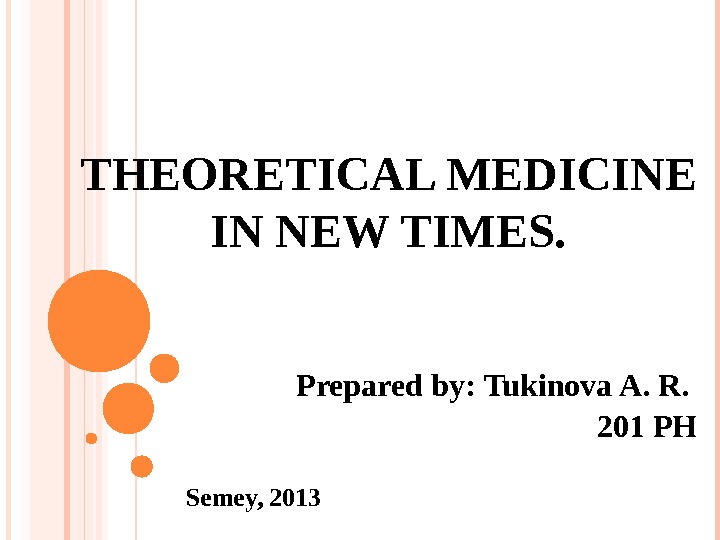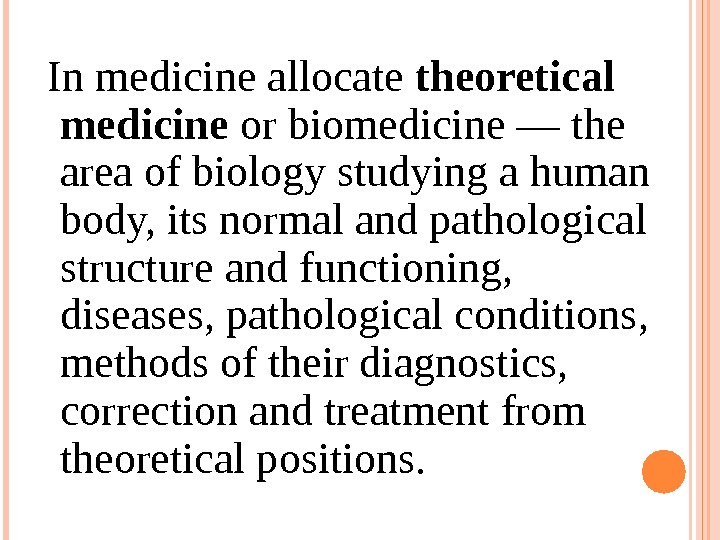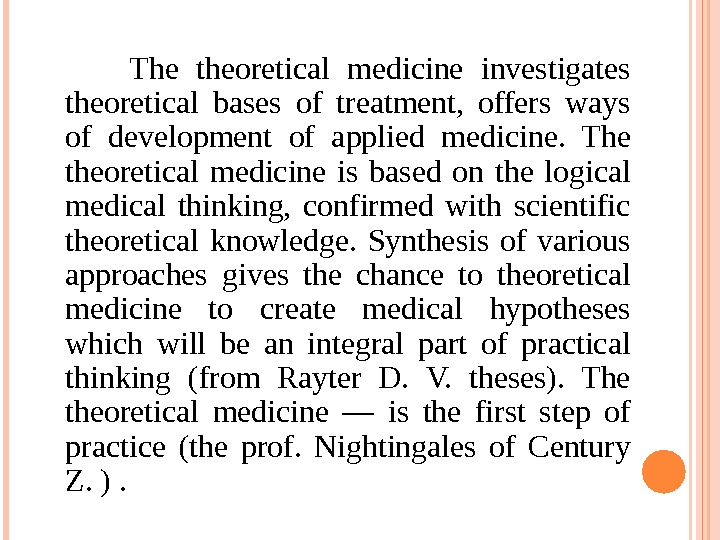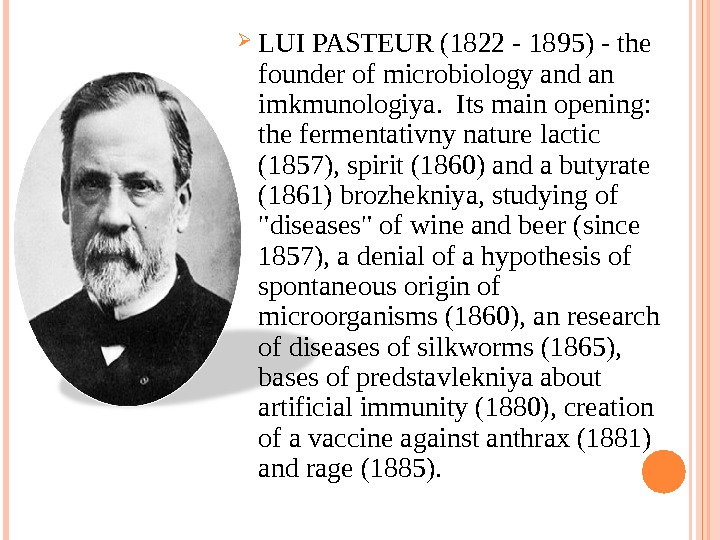THEORETICAL MEDICINE IN NEW TIMES. Prepared by :














tukinova_asel_201_ph_hist_of_med.ppt
- Размер: 1.3 Mегабайта
- Количество слайдов: 13
Описание презентации THEORETICAL MEDICINE IN NEW TIMES. Prepared by : по слайдам
 THEORETICAL MEDICINE IN NEW TIMES. Prepared by : Tukinova A. R. 201 PH Semey,
THEORETICAL MEDICINE IN NEW TIMES. Prepared by : Tukinova A. R. 201 PH Semey,
 PLAN Introduction The main part Conclusion Literature
PLAN Introduction The main part Conclusion Literature
 INTRODUCTION Medicine — area of scientific and practical activities on research of normal and pathological processes in a human body, various diseases and pathological conditions, to their treatment, preservation and human health strengthening.
INTRODUCTION Medicine — area of scientific and practical activities on research of normal and pathological processes in a human body, various diseases and pathological conditions, to their treatment, preservation and human health strengthening.
 In medicine allocate theoretical medicine or biomedicine — the area of biology studying a human body, its normal and pathological structure and functioning, diseases, pathological conditions, methods of their diagnostics, correction and treatment from theoretical positions.
In medicine allocate theoretical medicine or biomedicine — the area of biology studying a human body, its normal and pathological structure and functioning, diseases, pathological conditions, methods of their diagnostics, correction and treatment from theoretical positions.
 The theoretical medicine investigates theoretical bases of treatment, offers ways of development of applied medicine. The theoretical medicine is based on the logical medical thinking, confirmed with scientific theoretical knowledge. Synthesis of various approaches gives the chance to theoretical medicine to create medical hypotheses which will be an integral part of practical thinking (from Rayter D. V. theses). The theoretical medicine — is the first step of practice (the prof. Nightingales of Century Z. ).
The theoretical medicine investigates theoretical bases of treatment, offers ways of development of applied medicine. The theoretical medicine is based on the logical medical thinking, confirmed with scientific theoretical knowledge. Synthesis of various approaches gives the chance to theoretical medicine to create medical hypotheses which will be an integral part of practical thinking (from Rayter D. V. theses). The theoretical medicine — is the first step of practice (the prof. Nightingales of Century Z. ).
 Results of theoretical medicine do possible emergence of new medicines, deeper, molecular understanding of the mechanisms underlying an illness and process of recovery, thereby creating the base for all medical appendices, diagnostics and treatments.
Results of theoretical medicine do possible emergence of new medicines, deeper, molecular understanding of the mechanisms underlying an illness and process of recovery, thereby creating the base for all medical appendices, diagnostics and treatments.
 The XIX century was characterized by the beginning of formation of scientific medicine. Further development of the experimental direction in a fizioklogiya was promoted by F. Mazhandi, I. Moller, K. Bernar, E. du Bois-Reymond, G. Helmholtz’s works, etc. FRANÇOIS MAZHANDI (1783 — 1855) continued I. Prokhaska’s researches and proved existence sensitive (backs) and dvigaktelny (forward backs) nervous fibers of a spinal cord (1882) that defined compliance between structure and function (Bell-Mazhandi law). IOGANNES MOLLER (1801 — 1858) in 1833 formulated osnovkny provisions of the reflex theory.
The XIX century was characterized by the beginning of formation of scientific medicine. Further development of the experimental direction in a fizioklogiya was promoted by F. Mazhandi, I. Moller, K. Bernar, E. du Bois-Reymond, G. Helmholtz’s works, etc. FRANÇOIS MAZHANDI (1783 — 1855) continued I. Prokhaska’s researches and proved existence sensitive (backs) and dvigaktelny (forward backs) nervous fibers of a spinal cord (1882) that defined compliance between structure and function (Bell-Mazhandi law). IOGANNES MOLLER (1801 — 1858) in 1833 formulated osnovkny provisions of the reflex theory.
 CLAUDE BERNARD (1813 — 1878) developed bases of eksperimenktalny pathology: He studied physiological mechanisms a sokootdelekniya, value of digesting properties of a saliva, gastric juice, a pancreas secret. He created theory sugar a mocheiznurekniya, was engaged in research of nervous regulation of blood circulation, laid the foundation for the doctrine about a homeostasis. EMIL DOBUA-REIMON (1818 — 1896) developed methods of electrophysiological experiment, opened laws of irritation and a yavlekniya of electrotone (1848), formulated the molecular theory of biopotential.
CLAUDE BERNARD (1813 — 1878) developed bases of eksperimenktalny pathology: He studied physiological mechanisms a sokootdelekniya, value of digesting properties of a saliva, gastric juice, a pancreas secret. He created theory sugar a mocheiznurekniya, was engaged in research of nervous regulation of blood circulation, laid the foundation for the doctrine about a homeostasis. EMIL DOBUA-REIMON (1818 — 1896) developed methods of electrophysiological experiment, opened laws of irritation and a yavlekniya of electrotone (1848), formulated the molecular theory of biopotential.
 Opening of viruses. Successful fight against infections was promoted by creation and a prikmeneniye of vaccines (E. Dzhenner) and serums, origin of a scientific mikrokbiologiya (L. Pasteur, R. Koch). The microbiology became diferentiated on bacteriology, virology, a mycology, immunology, protozoology. EDWARD DZHENNER (1749 — 1823) — the founder of an ospoprivivaniye on a vaccination method. In 1798 published article «Researches of the reasons and actions. . . cow smallpox».
Opening of viruses. Successful fight against infections was promoted by creation and a prikmeneniye of vaccines (E. Dzhenner) and serums, origin of a scientific mikrokbiologiya (L. Pasteur, R. Koch). The microbiology became diferentiated on bacteriology, virology, a mycology, immunology, protozoology. EDWARD DZHENNER (1749 — 1823) — the founder of an ospoprivivaniye on a vaccination method. In 1798 published article «Researches of the reasons and actions. . . cow smallpox».
 LUI PASTEUR (1822 — 1895) — the founder of microbiology and an imkmunologiya. Its main opening: the fermentativny nature lactic (1857), spirit (1860) and a butyrate (1861) brozhekniya, studying of «diseases» of wine and beer (since 1857), a denial of a hypothesis of spontaneous origin of microorganisms (1860), an research of diseases of silkworms (1865), bases of predstavlekniya about artificial immunity (1880), creation of a vaccine against anthrax (1881) and rage (1885).
LUI PASTEUR (1822 — 1895) — the founder of microbiology and an imkmunologiya. Its main opening: the fermentativny nature lactic (1857), spirit (1860) and a butyrate (1861) brozhekniya, studying of «diseases» of wine and beer (since 1857), a denial of a hypothesis of spontaneous origin of microorganisms (1860), an research of diseases of silkworms (1865), bases of predstavlekniya about artificial immunity (1880), creation of a vaccine against anthrax (1881) and rage (1885).
 ROBERT KOCH (1843 — 1910) — the founder of bacteriology. He offered a method of cultivation of pure bacterial cultures on dense nutrient mediums (1877), finalized an etiology of anthrax (1876), opened the causative agent of tuberculosis (1882) and cholera (1883).
ROBERT KOCH (1843 — 1910) — the founder of bacteriology. He offered a method of cultivation of pure bacterial cultures on dense nutrient mediums (1877), finalized an etiology of anthrax (1876), opened the causative agent of tuberculosis (1882) and cholera (1883).
 CONCLUSION During this period there is a statement of various forms of rendering medical care: state, private, public contempt, insurance, national. Improvement of cooperation of doctors: periodicals (medical magazines), creation of medical societies, organization of congresses. Expansion of international relations. First international medical congresses.
CONCLUSION During this period there is a statement of various forms of rendering medical care: state, private, public contempt, insurance, national. Improvement of cooperation of doctors: periodicals (medical magazines), creation of medical societies, organization of congresses. Expansion of international relations. First international medical congresses.
 LITERATURE Internet resources
LITERATURE Internet resources

